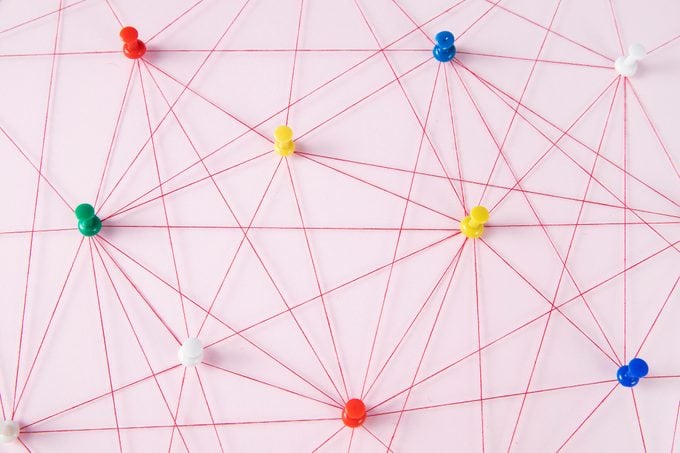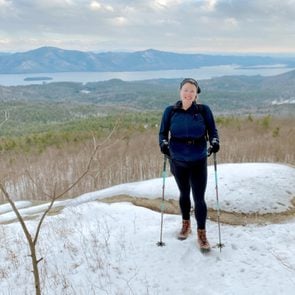Why Community Is So Important—and How to Find Yours
Updated: Feb. 01, 2023

We're not meant to go it alone. By following these tips, you can build a community and live a richer, fuller, healthier life.
Community isn’t something we give much thought to—that is, until we find ourselves isolated, as we did during the pandemic. Since those lonely days, a sense of community has become all-important. But what is community, exactly?
One of our greatest human needs is to belong. We’re not just social beings; we’re pack animals. Don’t believe it? Think about how people form cliques from grade school all the way through our professional lives. These social units are our community, and belonging to them gives us a sense of identity.
During the shelter-in-place ordinances, we lost that sense of belonging. We couldn’t meet up with our crew after work, celebrate at family gatherings or be in fellowship with our faith communities. It was a time of reimagining our relationships as we adopted new interpersonal and resiliency skills, like how to set boundaries while working from home, how to be happy during a time of tremendous stress and how to practice gratitude when it felt like the world was falling apart.
Now, we’re transitioning into our new normal, and many are sitting with questions like “What is community?” and “How do I build a community?” So let’s dig in to why community is important and how to go about finding yours. Spoiler alert: Considering the benefits of volunteering is part of it.
Get Reader’s Digest’s Read Up newsletter for more life tips, humor, cleaning, travel, tech and fun facts all week long.
What is community?
Community gives meaning to our lives. On its face, a community is just a group of people. But you can be within a group of people at the airport and not be in a community. The meaning and enrichment a group of people bring to our lives defines what a community is for us.
Your community could be the neighborhood you grew up in or live in now. It could be your church family, the friends you play sports with or other parents at the PTA. Wherever there is a shared interest, a common focus or a united cause, you have community.
What is the importance of community?
Gratitude journals and happiness meditations are great for our mental health, but they’re only part of what we need to be happy. A big aspect of finding joy is forming a community.
Humans aren’t made to go it alone. For a full life rich with meaning, we need to surround ourselves with others. A community can give us a sense of belonging and identity, help us learn and even keep us healthier in body, mind and spirit. Read on for some of the top benefits of forming a community.
Better well-being
Recent research in neuroscience has uncovered how our nervous systems respond to one another when in a community. Psychologist and neuroscientist Stephen Porges, PhD, suggests that our nervous systems work together in a system of co-regulation.
Imagine a parent comforting a crying child. The gentle voice and the parent’s touch soothe the child’s nervous system out of sympathetic activation (the fight-or-flight response) and into parasympathetic activation (rest and restoration). Similarly, the child’s return to calm soothes the parent. When we’re together in a community, a similar parasympathetic activation happens in our nervous systems on a larger scale, leading to states of well-being and euphoria.
Beyond that, there’s a significant correlation between companionship and happiness. Seems like a no-brainer, right? We’re happiest in good company (hence the smiles and laughter), and we feel down when lonesome.
A sense of security
A non-negotiable element of community’s meaning is the security it brings members. When you’re part of a community, you have people you can depend on who are just a phone call away. If your car breaks down, someone in your neighborhood can give you a lift. If a loved one passes away, your spiritual community can comfort you and offer guidance.
According to Tracking Happiness, “being and feeling safe is the foundation of living a fulfilling life.” Until we feel secure, we cannot focus on much else. A community provides a cornerstone of security on which we can build the rest of our lives.
Health improvements
When you’re part of a community, you don’t just reap mental health rewards. Your physical health benefits too.
If you have community support, you are naturally more resilient. And that sets you up for a longer life. Can’t quite see the connection between your community and your lifespan? Think of it this way: Having friends is a natural stress reducer. Lower stress means less likelihood of stress-related illnesses, such as high blood pressure, heart troubles and gut issues. While it’s not a panacea, engaging with a community is one more way to ensure you live a longer, healthier life.
For instance, a study out of the University of North Carolina at Chapel Hill found evidence of a connection between “social integration” and a lower risk of health issues such as high blood pressure; “social isolation,” on the other hand, correlated with conditions like increased inflammation. The study observed human health over decades, and its conclusion is, undeniably, this: We are healthier together.
Learning opportunities
Whether you’re showing someone how to connect Alexa to their house lights or learning how to soup up your engine, being part of a community gives you ample opportunities to learn from and teach others. There is strength in a diversity of talents, knowledge, lived experiences and skill sets. Perhaps you don’t know anything about how to fix a leak. Chances are, someone in your community does.
This is why mixed communities consisting of people from different age groups are so beneficial. Young people learn invaluable life lessons from elders, and elders learn how to work newfangled gizmos and gadgets from the youth. Beyond that, your community can teach you about other cultures and careers, helping you try new things and enrich your life.

Shared resources
This leads us to that old saying, “Sharing is caring.” When part of a community, we can share not only know-how but also resources. How great is it to be able to knock on a neighbor’s door and ask to borrow a spice you need for a recipe, or a drill that’ll help you finish that DIY project?
When we pool or share our resources, everyone wins and the bonds of the community are strengthened. Think of neighbors chatting over the fence or across the yard. This isn’t wasting time—it’s when the sharing of ideas, how-tos, recipes and family drama happens. Moments like these are what foster a sense of community.
Strengthened cooperation
Without a doubt, we can achieve more and go further together, thanks to collaboration. Without a community, we’d never learn the necessity of cooperation or lending a hand. Think of all the times you’ve helped friends move (or vice versa), thrown block parties as a community or picked up your neighbor’s kid from school because the parents were stuck at work—not to mention the times you were grateful to have a community that did the same for you.
And then there’s the larger-scale community planning that results in better neighborhoods. Through collaboration, we create the world we want to live in.
Greater empathy and compassion
When we see others in circumstances similar to our own—or others who are less fortunate than we are—and use our life experiences to understand what they’re going through, that’s empathy. And it helps us be better friends and community members.
When we build friendships within a community, compassion and empathy follow as we grow to care for those around us. It is compassion that rallies families to collect food and clothing for a family that has experienced a tragedy. It is empathy that allows us to sit and listen to another’s concerns and worries because we know what it’s like to struggle with maintaining a positive attitude or to go through hard times.
The show of support through compassion and empathy is one of the most heartwarming aspects of being part of a community.
How to build a community
Building a community takes time and effort (and yes, you may need to talk to strangers at first), but it’s well worth your while. To get started, try the tips below.
Seek out local events
Find a community in your own backyard by keeping an eye out for events in your area. Check your local paper for weekly community events, like book clubs, rotary clubs or tai chi classes.
Other ways to connect with your local community include joining a place of worship and signing up for a sports team at the local rec center. Don’t keep your desire for community a secret. Let friends, family and colleagues know you’re looking to find your place, and they may recommend a group that speaks to your values. You may find yourself joining co-workers for a night of knitting each week or belting out songs at Friday night karaoke with the neighborhood crew.
Look online
Hunt for a local community online by creating a profile on community-focused sites like Meetup.com. There, you can find fellow gamers, wine enthusiasts, hikers and people who share a variety of hobbies and interests. Once you’ve joined a group, find an event that speaks to you and begin building those social connections. The site will point you to online events as well as in-person gatherings.
That’s right: Online communities count! For instance, if you can’t find a local book club that fits your interests and schedule, join one online. (We may be biased, but the Reader’s Digest Book Club is a great place to find a community of book lovers.)
Become a volunteer
Volunteering adds meaning and purpose to our lives. So think of the causes you’re passionate about and get involved! Maybe you help out at a soup kitchen or food bank or offer to deliver meals to housebound adults in your church. Not only will you build community with the other volunteers and staff, but you’ll also get the satisfaction of helping others.
Call up old friends
Don’t overlook those old connections you’ve let fall by the wayside. Reach out to friends you’ve lost touch with and climb out of the “friendship recession” many of us find ourselves in.
Don’t be discouraged by the amount of time that’s passed since you last chatted. Chances are, your pals will be overjoyed that you thought enough to reach out and call. And you’ll be thrilled to have these important people back in your life again. After all, what is community if not the people who enrich our lives?
Sources:
- Forbes: “How to Build Community and Why It Matters So Much”
- Psychology Today: “The Neuroscience of Feeling Safe and Connected”
- Psychology Today: “How We Can Rebuild Communities After the Pandemic”
- Psychology Today: “The Importance of Cultivating Community”
- Tracking Happiness: “5 Tips to Feel More Secure in Life (and Why It’s So Important)”
- PNAS: “Social relationships and physiological determinants of longevity across the human life span”




















